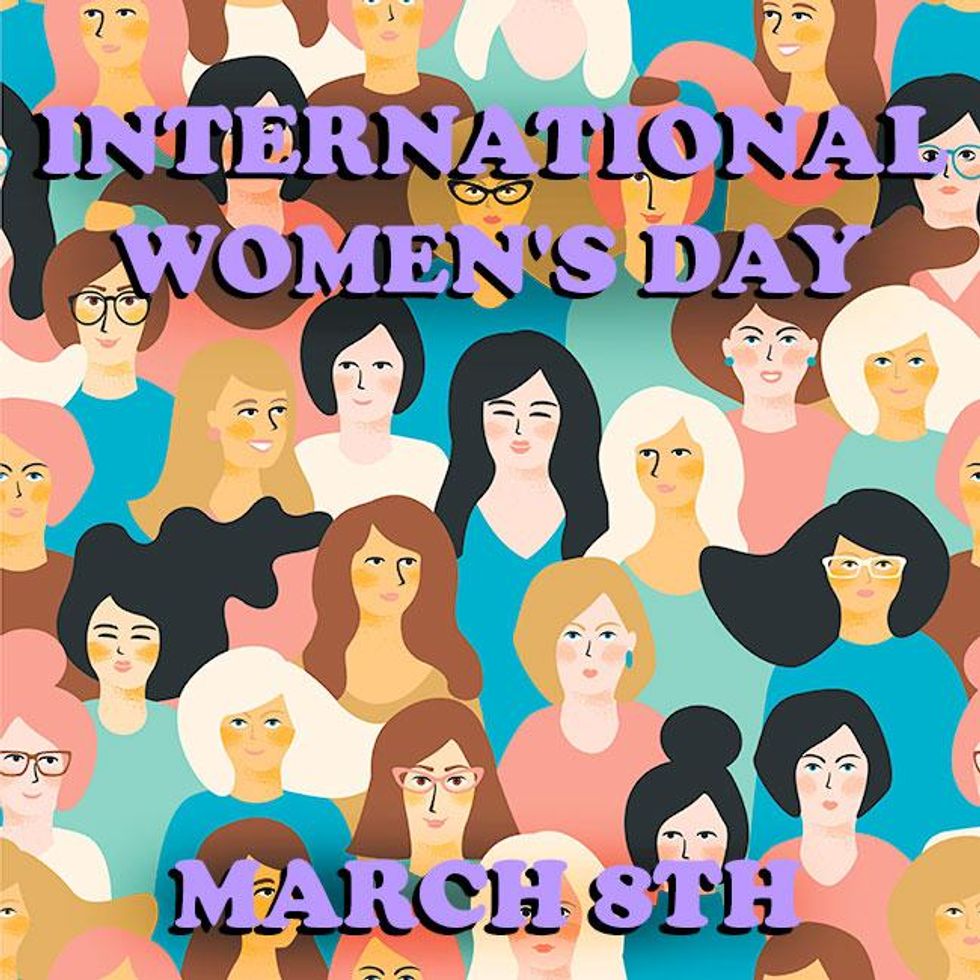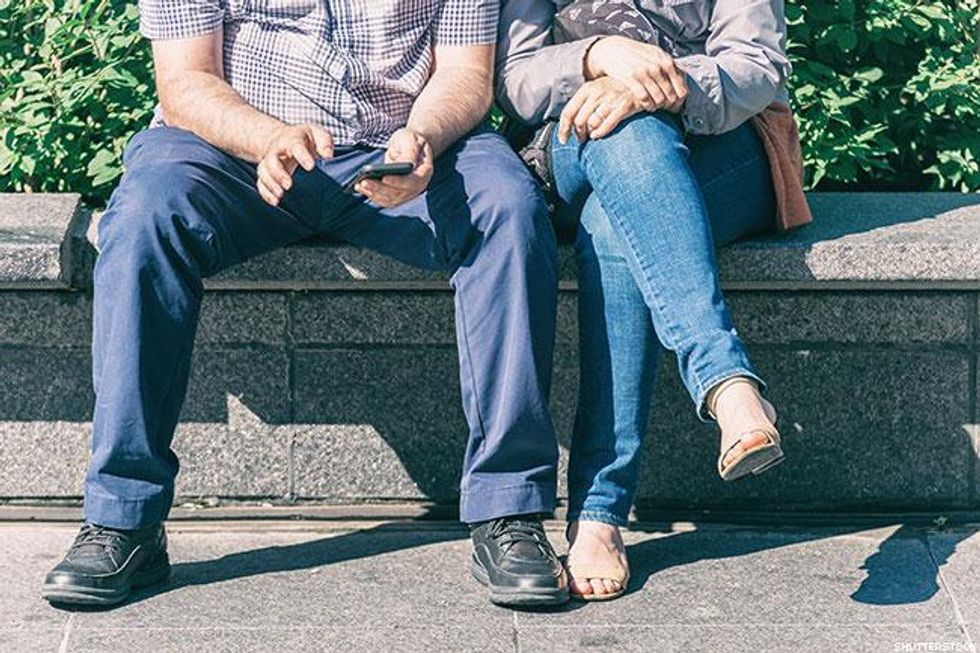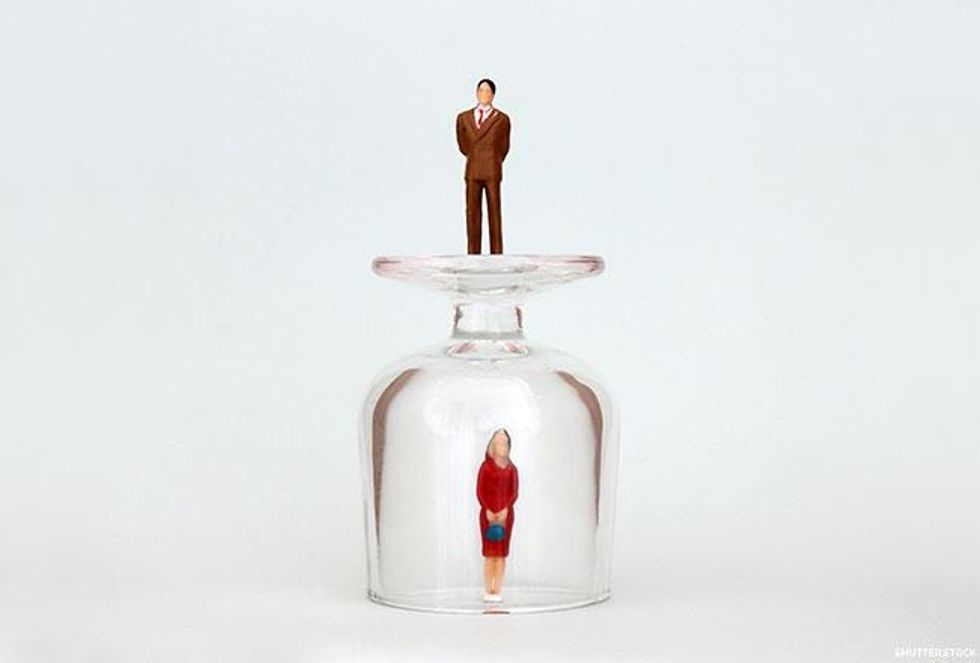What Men Are Doing on International Women's Day
03/08/19
By continuing to use our site, you agree to our Privacy Policy and Terms of Use.

Today is International Women's Day, when we honor women across the globe. Here is how men are marking this important occasion. #NotAllMen

Last summer, the Census Bureau put out a report that determined that, on average, "a woman earns 80.5 cents for every dollar a man earns, and women's median annual earnings are $10,086 less than men's." The gap only gets wider for women of color. White women earn 79 percent of what white men do, while black women earn 63 percent and Hispanic women earn 54 percent.

A Stanford study of smartphone data in 2017 found that women "walk disproportionately fewer steps each day than men." The issue of personal safety continued to arise when women were questioned about their walking habits.
"I've noticed that, because I tend to take cars such short distances, guy friends will go, 'Oh, my God, you should have just walked, you're so lazy,'" one woman explained to The Guardian. "I think it's funny that to men it can come across as lazy when it's so obvious to women that it's self-preservation. I've never got that comment from a woman."

"Manspreading" became a buzzword a few years back when social media users began posting pictures of men taking up more space than necessary in public spaces -- particularly on public transportation.
Psychologist Amy Cuddy found that "beta" postures increase stress levels and lower testosterone. Meanwhile, alpha power poses make "make you physiologically less stressed." So, for the sake of their health, women should just start taking up more space than usual even if society deems women spreading on the subway poor etiquette.

Even after the Time's Up movement, inclusion riders, and a lot of lip service around the idea of equity for women in Hollywood, not a single woman was nominated in the Best Director category in 2019 (or most years). And there were solid options, like Can You Ever Forgive Me?'s director, Marielle Heller. Only three women have ever been nominated in that category in nearly 90 years, and Kathryn Bigelow is the only woman to ever win the prize, for 2009's The Hurt Locker.

Men have been issuing seemingly innocuous directives like "Smile, it's not that bad" and "Can I get a smile?" to women for ages, not really caring about whether she's having a bad day, just in her own head, or isn't prone to smiling.
During the 2016 presidential campaign, Hillary Clinton was repeatedly told to smile on social media while the same was not being asked of her "grab them by the pussy" counterpart.
"Telling anybody to do anything can rub you the wrong way, particularly if it's not natural to you," says biological anthropologist Helen Fisher.
Fisher determined that men might ask women to smile out of concern (although men don't tend to tell other men to smile, so it's inherently sexist). Or they do it to control the woman.
The really twisted part of telling a woman to "smile more" is that men tend to view smiling as a sign of weakness. Alpha men rarely smile, according to Fisher.
The phenomenon of telling women to smile is so widespread that artist Tatyana Fazlalizadeh created the art project "Stop Telling Women to Smile."
"The work attempts to address gender based street harassment by placing drawn portraits of women, composed with captions that speak directly to offenders, outside in public spaces," reads her artist's statement.

There are many sociological reasons for why it appears that men's ideas are heard and acknowledged in the workplace more than women's. Or that sometimes they appear to steal women's ideas. Writing for Forbes, Caroline Turner points to the socialization of girls to "share" and to "wait their turn" while boys are encouraged to essentially colonize spaces.
"Women who behave in feminine ways aren't seen as powerful, women who "overly" use masculine approaches (like being competitive and assertive) are not liked," Turner writes. "This is the double bind. Many women do speak up, assert their ideas with authority, interrupt, and hold the floor when interrupted. But the double bind may penalize them for doing so."
Another theory for why men appear to take credit for women's ideas is that they view the workspace as a game -- a competitive arena as opposed to a collaborative environment.

Hillary Clinton earned 3 million more actual votes than Donald Trump in 2016 and she would have won the presidency if it weren't for that pesky little Electoral College -- and WikiLeaks, Russian bots, an eleventh-hour email dump at the hands of FBI director James Comey that turned up nothing, and some old-fashioned misogyny in terms of those who flat-out refused to vote for her because of her gender.
But the 2016 election is not the only specious election in recent years. Questions remain around last November's gubernatorial election in Georgia in which Stacey Abrams conceded to Republican Brian Kemp amid voter fraud.
"If Stacey Abrams doesn't win in Georgia, they stole it," Ohio Sen. Sherrod Brown said in November. "They [Republicans] win elections by redistricting and reapportionment and voter suppression and all the ways they try to scare people, particularly people of color."

A photo of R. Kelly exploding in anger in Gayle King's face during an interview about the numerous sexual assault allegations leveled against him went viral just this week. Last fall, Supreme Court nominee Brett Kavanaugh displayed histrionics during his vetting that would have rendered any woman unfit for the job in the court of public opinion. But despite his unfettered rage, he's now a Supreme Court justice.
In a 2008 study, Yale University psychologist Victoria Brescoll found, "An angry woman loses status, no matter what her position."
The study involved men and women watching videos of actors applying for jobs. The participants were then asked to rate the applicants on how much responsibility they should be afforded in a job, "their perceived competence, whether they should be hired, and how much they should get paid."
Both men and women in the study decided that "angry men deserved more status, a higher salary, and were expected to be better at the job than angry women."

Merriam-Webster added "mansplaining" to its lexicon in 2018, tracing its roots to Rebecca Solnit's 2008 essay "Men Explain Things to Me" when she informed a man at a party she was attending that she'd written a book about the 19th-century photographer Eadweard Muybridge. The man then went into great detail about a book he was reading about Muybridge while never stopping to figure out that it was, in fact, her book he was explaining to her.
One of the more famous examples of "mansplaining" in popular culture occurred in 2015 when Matt Damon, on his show Project Greenlight, explained diversity to filmmaker Effie Brown, a woman of color.
Last year, a writer for the BBC devised a handy diagram to let men know if they're "mansplaining."

Last year, the Harvard Business Review found that a big piece of why women don't appear to move up the ladder at work the way men do is because they are either sociologically programmed to say "yes" to doing "non-promotable tasks."
"Non-promotable tasks are those that benefit the organization but likely don't contribute to someone's performance evaluation and career advancement. These tasks include traditional office 'housework,' such as organizing a holiday party, as well as a much wider set of tasks, such as filling in for a colleague, serving on a low-ranking committee, or taking on routine work that doesn't require much skill or produce much impact," according to Harvard Business Review.
"In the study, nearly everyone was reluctant to volunteer for non-promotable tasks. Yet, women accepted a request to volunteer 76% of the time, while men accepted the request only 51% of the time," wrote Forbes. "This shows us that men are more comfortable than women with saying no."